-
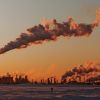 +7 +1
+7 +1Oilsands polluted more than entire economies of B.C. or Quebec
Pollution from fossil fuels in Canada continues to grow by staggering amounts, with the oilsands sector alone responsible for more carbon pollution than all of B.C. or Quebec in 2017, says the federal government in its latest climate change report to the United Nations. The newest edition of Canada’s National Inventory Report, covering data up to two years ago, shows that the oil and gas sector was responsible for 195 million tonnes, or megatonnes (Mt) of greenhouse gas emissions in 2017, up eight Mt from 2016.
-
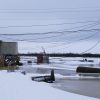 +7 +2
+7 +2Bering Sea ‘has reached climate conditions not expected until 2050’
Scientists who study the northern Bering Sea say they’re seeing changed ocean conditions that were projected by climate models – but not until 2050. The rapid changes are leading researchers to wonder if ecosystems near the Bering Strait are undergoing a transformation. The Bering Sea saw record-low sea ice last winter. Oceanographer Phyllis Stabeno says it’s too early to attribute the changes to climate change and she expected a bounce-back this winter.
-
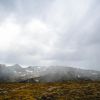 +6 +2
+6 +2The trouble with thaw
About one fourth of the Northern Hemisphere is covered in permafrost. Now, these permanently frozen beds of soil, rock, and sediment are actually not so permanent: They’re thawing at an increasing rate. Human-induced climate change is warming these lands, melting the ice, and loosening the soil. This may sound like any benign Spring thaw, but the floundering permafrost can cause severe damage: Forests are falling; roads are collapsing; and, in an ironic twist, the warmer soil is releasing even more greenhouse gases, which could exacerbate the effects of climate change.
-
 +30 +4
+30 +4Warming pushes lobsters and other species to seek cooler homes
This is the eighth in a 10-part series about the ongoing global impacts of climate change. These stories will look at the current effects of a changing planet, what the emerging science suggests is behind those changes and what we all can do to adapt to them. Last August, the Gulf of Maine experienced a heat wave. Average water temperatures at the surface reached the second-highest level ever recorded: 20.52° Celsius (68.93° Fahrenheit). That’s still a bit chilly for any person who might go for a dip. And it’s even colder diving beneath the surface.
-
 +10 +2
+10 +2Radical climate action 'critical' to Great Barrier Reef's survival, government body says
Australia's top Great Barrier Reef officials warn the natural wonder will virtually collapse if the planet becomes 1.5 degrees hotter – a threshold that scientists say requires shutting down coal within three decades. This federal election campaign is a potential tipping point for Australia's direction on climate action, as the major parties pledge distinctly different targets for cutting greenhouse gas emissions.
-
 +19 +3
+19 +3As the seas rise, Republicans will deserve all the blame their grandchildren assign them
New studies point to the retreat of Earth’s glaciers and discovery of radioactive material in those glaciers that could threaten the global food chain.
-
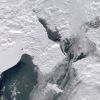 +2 +1
+2 +1Bering Sea changes startle scientists, worry residents
The Yupik Eskimo village of Kotlik on Alaska’s northwest coast relies on a cold, hard blanket of sea ice to protect homes from vicious winter Bering Sea storms. Frigid north winds blow down from the Arctic Ocean, freeze saltwater and push sea ice south. The ice normally prevents waves from forming and locks onto beaches, walling off villages. But not this year.
-
 +2 +1
+2 +1The young Republicans breaking with their party over climate change
Donald Trump’s indifference, punctuated by bursts of mocking disdain, towards climate change has been indulged and even cheered by his supporters. The president has called climate science “bullshit”, donned a coalminer’s helmet at rallies and defenestrated federal rules designed to cut planet-warming emissions.
-
 +1 +1
+1 +1Electric vehicle adoption improves air quality and climate outlook
If you have ever wondered how much electric vehicle (EV) adoption actually matters for the environment, a new study provides evidence that making this switch would improve overall air quality and lower carbon emissions. The Northwestern University study quantified the differences in air pollution generated from battery-powered electric vehicles versus internal combustion engines. The researchers found that even when their electricity is generated from combustion sources, electric vehicles have a net positive impact on air quality and climate change.
-
 +3 +1
+3 +1Cheap, safe 100% renewable energy possible before 2050, says Finnish uni study
A global transition to the exclusive use of renewable energy sources is not only possible but also cheaper and safer than reliance on fossil fuels and nuclear energy, according to a new study from the Lappeenranta University of Technology (LUT) and the Energy Watch Group (EWG) from Germany. The study claims that the rapid development of renewable energy sources and energy storage technology will likely make it possible for the entire planet to reduce its CO2 emissions to zero even earlier than the current 2050 deadline.
-
 +22 +6
+22 +6Trump administration sabotages major conservation effort, defying Congress
Scientists and officials around the US have told the Guardian that the Trump administration has withdrawn funding for a large, successful conservation program – in direct contradiction of instructions from Congress. Unique in scale and ambition, the program comprises 22 research centers that tackle big-picture issues affecting huge swaths of the US, such as climate change, flooding and species extinction. They are known as Landscape Conservation Cooperatives – or were, because 16 of them are now on indefinite hiatus or have dissolved.
-
 +2 +1
+2 +1White Americans’ diets are particularly bad for the planet
White Americans may be committing more food-related offenses than under seasoned chicken: Their diets produce more greenhouse gases than those of other racial and ethnic groups in the United States.
-
 +15 +4
+15 +4More than 3,500 Amazon employees push for aggressive action on climate change
Over 3,500 Amazon employees on Wednesday urged the company to take aggressive action on climate change and reduce its carbon footprint. Workers called on Amazon to stop offering custom cloud-computing services that support the oil and gas industry in extracting more fossil fuels. They also said Amazon has failed to disclose a company-wide plan to reach zero carbon emissions within the timeline required by science, and that its 100% renewable energy goal has no deadline.
-
 +8 +1
+8 +1John Kerry: Rep. Ocasio-Cortez shown 'more leadership in one day' than Trump in 'his lifetime' on climate change
Former Secretary of State John Kerry blasted Republicans and President Donald Trump during congressional testimony on Tuesday, saying that freshman Rep. Alexandria Ocasio-Cortez had shown more leadership than the president has in his life when it comes to the issue of climate change.
-
 +4 +1
+4 +1Atlantic Ocean Current Slowdown Froze The Earth In The Past - Would That Happen Again In The Future?
Scientists have suspected that the phenomena of the longtime pattern of fluctuating freezing temperatures and warm seasons that suddenly changed a million years ago and the ice ages appeared to last longer and be more dramatic. Somehow this event was related to a shutdown of a key of Atlantic Ocean current system that is repeatedly slowing.
-
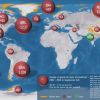 +8 +1
+8 +1Earth's glaciers lost 9 trillion tons of ice. That's the weight of 27 billion 747s.
Nine trillion metric tons. That's how much ice Earth's glaciers lost in the 55 years between 1961 and 2016. An international team of scientists used satellite and direct field observations to conclude that Earth's glaciers have melted such a profound sum of ice in the last half-century. They published their report Monday in the journal Nature.
-
 +20 +5
+20 +5From ruined bridges to dirty air, EPA scientists price out the cost of climate change
By the end of the century, the manifold consequences of unchecked climate change will cost the U.S. hundreds of billions of dollars per year, according to a new study by scientists at the Environmental Protection Agency. Those costs will come in multiple forms, including water shortages, crippled infrastructure and polluted air that shortens lives, according to the study in Monday’s edition of Nature Climate Change. No part of the country will be untouched, the EPA researchers warned.
-
 +23 +4
+23 +4Earth will take 'millions of years' to recover from climate change mass extinction
Earth is likely to take millions of years to recover from the destruction currently being inflicted by humanity, scientists have warned. A “speed limit” on the rate of evolution means it will take at least 10 million years for the world’s diversity to return to pre-human levels, according to a new study. Manmade climate change is decimating ecosystems and currently wiping species out at such a rate that scientists have concluded we are living through the “sixth mass extinction”.
-
 +27 +9
+27 +9'Losing Earth' Explores How Oil Industry Played Politics With The Planet's Fate
Climate change is often thought of as a partisan issue in the United States, but New York Times journalist Nathaniel Rich says that wasn't always the case. Rich says that from 1979 until 1989, climate change was viewed as a bipartisan problem — then the the oil industry "descended and bared its fangs" and everything changed.
-
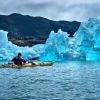 +26 +6
+26 +6Glaciers have lost more than 9 trillion tons of ice since 1961
The loss led to a 27-millimeter increase in global sea levels over this period, researchers found. Alaska glaciers were the largest contributors, followed by melting ice fields in Patagonia and glaciers in the Arctic regions. Glaciers in the European Alps, the Caucasus mountain range, and New Zealand were also subject to significant ice loss. Due to their relatively small glacierized areas, however, they played only a minor role when it comes to the rising global sea levels.
Submit a link
Start a discussion




















